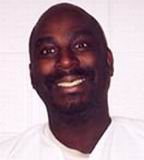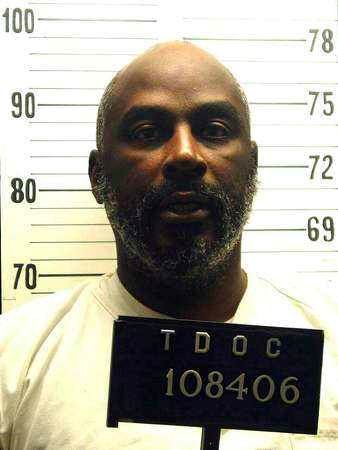Gregory Thompson
InternationalJusticeProject.org
Mental Illness
Schizophrenia
Tennessee
Execution Date: Execution stayed.
Gregory Thompson was convicted of first degree murder
and received a capital sentence following a jury trial on 22 August,
1985. The essential facts of the case are not in dispute.
Thompson and his companion, Joanne McNamara, stranded
in Shelbyville, Tennessee with neither money nor transport, were looking
to return to Georgia. On 1 January, 1985, Thompson abducted Brenda Lane
at knifepoint at a Wal-Mart store in Shelbyville. He then forced her to
drive himself and McNamara to a remote location outside Manchester,
Tennessee. There he stabbed Brenda Lane several times causing her to
bleed to death. Thompson was arrested on 2 January. Whilst in custody he
gave a statement admitting his guilt.
History of Mental Illness
Gregory Thompson has been diagnosed with
undifferentiated schizophrenia, delusions and hallucinations.
Thompson did not receive any medical treatment until
after his incarceration. However, psychological evaluations suggest that
his condition may have begun in early adulthood, which is the norm for
those who suffer from schizophrenia and psychosis. Dr. Sultan, who has
been conducting periodic psychological examinations of Thompson from
1998 until the present date, also suggests that Thompson's family
history is 'positive for mental illness.'
Thompson's family history is indeed troubled; his
mother died when he was aged three and he was raised by his grandmother,
who grieved excessively and had an alcohol dependency. His grandmother
would sometimes stay in bed for days without leaving any food in the
house for Thompson and his siblings. He also witnessed several beatings
of family members and the brutal beating and rape of his mother.
His grandmother remembers that she would 'yell'
at Thompson and afterwards he would repeatedly bang his head into the
wall to 'try and knock the devil out.' At school, Thompson hysterically
cried so much that he was nicknamed 'Fire Engine' due to the sound he
made. Dr Sultan, in reference to Thompson's family circumstances, stated
"if you look back in the childhood of this man, the beginnings of mental
illness are apparent."
Thompson suffered four major head injuries before the
age of 23. At age 15 he was in a car accident where he was thrown
through the windscreen and suffered a severe seizure following the
trauma. During his time in the military, he was attacked by several men
wielding crowbars and again he had a seizure following the attack.
After this particular head injury, several people
close to Thompson noted a change in his personality. His girlfriend at
the time, Ms Cajulao, described him as 'caring and sensitive' before the
injury but noted that he became 'paranoid and unreasonably concerned
about his and her safety' after the attack in the military.
Whilst in the military, Thompson was instructed to
see a psychiatrist, but Dr. Sultan states that he was too frightened to
do so. When he returned from the military, his grandmother observed him
staring into space for long periods of time and mumbling to himself. She
described him as very different from the boy who left for service and
suggested that he be taken to the psychiatric unit at Grady Hospital.
His sister, Ms Wharton, whom he lived with after the
military incident, described him as 'bizarre' and 'paranoid' when he
returned, noting that she was afraid of him for the first time in her
life and that she could no longer identify with her brother. She
described serious episodes of emotional upset and aggression that led to
her approaching her grandmother about obtaining treatment for him.
Dr. Rabun, who evaluated Thompson in March 2003 and
January 2004, also noted that his mental illness was present before he
went to prison and that it was exacerbated by his incarceration.
Current Diagnosis
Thompson has been treated by the Tennessee Department
of Corrections since the late 1980's and assessed by several
psychologists, most of whom diagnose him with undifferentiated
schizophrenia, delusions and hallucinations. He has been taking
antipsychotic, antidepressant and mood stabilizing drugs. Medical
records indicate that Thompson's mental health has been deteriorating
since he was incarcerated in 1985.
One psychologist who treated Thompson on death row
believed he was malingering and discontinued his medication. Thompson
reacted badly to this change in treatment and Dr. Sultan, who
interviewed him at this time, stated that Thompson in a non-medicated
state is 'floridly psychotic.'
Dr. Sultan reported that his speech became so
disorganised and frantic that it was largely incomprehensible. He also
became agitated, aggressive and perceived danger everywhere around him.
Thompson was also experiencing the delusion that he was residing on a
slave ship from Africa and that the guards were 'slave traders.' Dr.
Sultan believes that his medication relieves some of his symptoms but
the major symptoms of schizophrenia are still present even when he is
receiving medication.
Competency
On 8 April 2004, the Supreme Court of Tennessee heard
an appeal on the issue of Gregory Thompson's competency to be executed.
Tennessee law states that a prisoner is not competent to be executed if
he lacks the mental capacity to understand the fact of the pending
execution and the reason for it (Van Tran 6 S.W 3d).
Prior to the competency hearing, Thompson was
evaluated by several mental health experts; Dr. Faye Sultan, Dr. George
Woods, Dr. Michael First and Dr. John S. Rabun. They each determined
that he was incompetent to be executed as he did not grasp either the
reality or nature of his impending execution or the reason for it.
Further, each diagnosed him as suffering from schizophrenia.
The evidence of each expert was presented to the
Supreme Court of Tennessee; however the Court denied a hearing on
Thompson's competency to be executed. Although the Court accepted that
the mental health reports indicated that Thompson was schizophrenic and
noted that each expert stated he was incompetent, the Court held that
the reports actually illustrated his competency to be executed.
In reaching this conclusion the Court placed emphasis
on Thompson's awareness of his impending execution and his understanding
that the sentence was passed for the murder of Brenda Lane.
The state relied heavily on statements made in this
regard by Thompson. For example, in an examination with Dr. Rabun,
Thompson mentioned that during the 'second phase' of his trial he had
been sentenced to 'death' and that executions in Tennessee are by 'lethal
injection or electric chair.' This, the Court suggested, shows he
understands that he was given a capital sentence and that he knows how
the death penalty is carried out. Thompson also told Dr. Rabun that he
was convicted in 1985 of first degree murder, which could indicate that
he understands the reason for his death sentence.
In contrast the Court rejected the notion that
Thompson's mental illness and corresponding beliefs and psychosis raised
genuine issues regarding his competency. In an evaluation with Dr.
George Woods, Thompson stated that even if he is executed, he will 'stay
alive for two years.' He also mentioned that after his execution he will
'go to Hawaii.' Dr. Sultan, when evaluating Thompson, noted that he
believes he was a 'lieutenant' in the Navy and will therefore have a
military trial, which will exonerate him. Thus, he believes that he will
not be executed. According to the experts, this suggests that Thompson
does not understand the fact of his execution.
The Court rejected each expert's
conclusion, finding Thomson competent to be executed.


